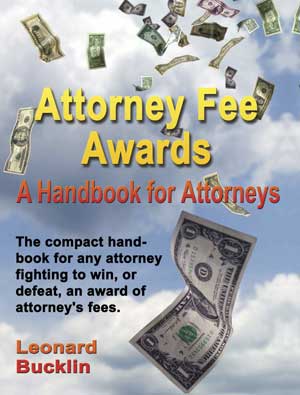
Attorney Fee Awards: A Handbook for Attorneys
Sample Text -- Attorney fee award disposition in settlement
Do attorney fees awarded to a prevailing party belong to the attorneys who labored to earn them or to their clients? Some plaintiff's attorneys have lost getting paid, plus have been caught up in disputes with their clients and grievance committees -- because of the lawyer's faulty understanding of "who owns the attorney fee award."
The following from Attorney Fee Awards is a sample of what is now the trial lawyer's basic reference for recovering, or defeating, an award for attorney fees. Attorney Fee Awards is the "trial lawyers handbook". It's a handbook, not a scholarly $700 tome in a half dozen volumes. It's the one best compact handbook to coach you with vital law, practical advice, and proven forms. Ready to use. Buy, download, and use from your computer today!
§ 12.02 Settlement tactic for defense counsel; trap for plaintiff's counsel expecting an attorney fee award.
Do attorney fees awarded to a prevailing party belong to the attorneys who labored to earn them or to their clients? Some plaintiff's attorneys have lost getting paid, plus have been caught up in disputes with their clients and grievance committees -- because of the lawyer's faulty understanding of "who owns the attorney fee award".
"Who owns the attorney fee" is important in settlement negotiations. For example, if the attorney fee award is likely to be more than the attorney's fee contract with the client provides, if the client "owns" the fee award, the client may benefit by waiving the attorney fee award as a condition of a defense offer to pay her a comfortable settlement amount for the substantive claim. As another example of why that question is important, consider that the answer to that question of "who owns the fee award" determines who must sign the settlement agreement as a party to the settlement contract.
In most states and under most federal statutes, and almost always in federal court common law decisions, the reasoning is that where attorney fees can be awarded to the "prevailing party," the right to receive the attorney fee award belongs exclusively to the party and not to the party's lawyer, thus allowing clients – not the lawyer – to bargain with the adversary about the attorney fees, including waiving statutory attorney fee awards.
Generally, the legal theory is that the right to seek and to receive an attorney fee is a cause of action (or part of it) that the client owns.
In most states, an attorney cannot avoid the settlement power of the client on the attorney fee amount. That is because attorneys ethically are forbidden from taking an assignment of the cause of action they are prosecuting for the client. That means, among other things, just as the client cannot assign his/her entire liability cause of action to the attorney, so too the attorney ethically cannot request the client to assign the right to recover the attorney fee to the attorney.
Non-assignablity of client causes of action to the attorney forms the base for a settlement tactic for defendants in cases involving fee-shifting states authorizing an attorney fee award to the prevailing party. Here's why. There are many cases that present legitimate claims by an individual where the plaintiff needs an attorney even though the case is a low-value actual damages case with little damages to be recovered for the injury. Civil rights cases are a prime example of such cases, but there are hundreds of statutes granting "reasonable attorney fees to the prevailing party." E.g., in Texas, every contract case is a case in which reasonable attorneys fees are available to the prevailing party.
The norm in these low-value actual damages, but statutory attorney fee, cases is for the attorney to undertake the case on the alternative basis of either (A) a contingent fee of the substantive damages award or (B) the attorney fee awarded by the court, whichever is higher.
Defendants in such cases have learned to use the tactic of offering a lump-sum settlement (for both the substantive case damages plus any attorney fee award) that benefits the plaintiff but does not provide enough for the plaintiff's lawyer's time investment in the case. It's a tactic that works in cases of small substantive damages but large attorney fee awards.
For example, suppose a case of racial discrimination in employment, that the claimant's attorney has the case on a 33% contingency fee contract, and has put in $50,000 of time bringing the case up to the courthouse door. Suppose further that the main economic damage of the plaintiff is the payment of $20,000 in lost wages until she found alternative better-paying employment. The defendant offers a total of $60,000 for a total settlement "including a waiver of any claim for attorney fees." To the plaintiff such a settlement sounds good: she gets $60,000, deducts and pays her attorney $20,000 in accord with the fee contract, and she winds up with $40,000 for her $20,000 in economic loss. But to the attorney, he winds up with $20,000 in fees to pay for $50,000 of time invested.
Alert defense counsel will always issue a demand for production of the plaintiff attorney's fee contract. If the fee award is a part of the issues, then the attorney-fee contract is a legitimate target of discovery. Once a contingent fee contract is found, the defense always should think in terms of a lump sum settlement "including a waiver of any claim for attorney fees".
Attorneys seek various ways of protecting themselves, often by fee contract clauses that are not ethically proper or are otherwise unenforceable. For example, the lawyer in Pony v. County of Los Angeles7 was working on such a case, and reasonably expected that the defendant would offer to settle for a small amount including the attorney fee award. To protect himself he devised a retainer agreement that transferred a plaintiff's right to seek fees to the attorney himself -- letting him sue for his fees even after his client settled. As happens in these cases with regularity, the U.S. Circuit Court of Appeals held the fee contract clause invalid. The Court stated:
The Supreme Court has held that Section 1988 vests the right to seek attorney's fees in the prevailing party, not her attorney, and that attorneys therefore lack standing to pursue them. [citing numerous cases] ... Once the prevailing party exercises her right to receive fees, [assuming the fee contract gives the attorney the fee award] the attorney's right to collect the fee vests, and he may then pursue them on his own. Virani, 89 F.3d at 578. Unless and until the party exercises this power, however, the attorney has no right to collect fees from the non-prevailing party, and the non-prevailing party has no duty to pay them. Id. A prevailing party may waive her statutory eligibility for attorney's fees as a condition of settlement. Evans, 475 U.S. at 737-38 (concluding that 42 U.S.C. § 1988 does not create a general rule prohibiting settlements conditioned on the waiver of fees).
In this case, Pony, the prevailing party, did not exercise her rights to pursue attorney's fees. To the contrary, she waived them as a condition of settlement with the County. Accordingly, under the Court's ruling in Evans and our ruling in Virani, Mitchell has no standing to pursue attorney's fees merely as a result of his position as Pony's former attorney.
Mitchell argues that he need not rely on his status as Pony's former attorney. He contends that he has standing under his retainer agreement with Pony, whereby she assigned her rights to apply for attorney's fees to him. If the assignment is valid, Mitchell argues, he stands in her shoes and may assert her rights to statutory attorney's fees as if she had asserted them herself. However, Pony's putative assignment to Mitchell is invalid because the right to seek attorney's fees under 42 U.S.C. § 1988 is a substantive cause of action which cannot be transferred contractually.
Pony v. County of Los Angeles, 433 F.3d 1138 (9th Cir. 2006).
But in a few states — attorney fee award ownership is different, because of state court common law decisions. In those few states — if the fee contract between attorney and client specifies that the attorney fee award will be the attorney's fee due from the client — then it is held that the attorney fees awarded to a prevailing party belong to the attorneys, not to their clients. The theory of those few courts is that such fee ownership by the attorney is needed to increase public vindication of fundamental public policies: that is, attorneys need assurance that, if they obtain a favorable result for their client, they will actually receive reasonable attorney fees awarded by the court, instead of a lesser sum the client is willing to pay.
The above excerpt is protected by copyrights. It is presented here to help you decide on your purchase of a handbook on attorney's fees. The footnotes included in the book's text have been deleted for this Internet view of sample pages.
Attorney Fee Awards: a handbook is the basic reference for recovering, or defeating, an award for attorney fees. Law, practical advice, and proven forms. Concise, frank and practical: the sort of advice you would get from a senior litigator being in your office and being your mentor.

Our "100% money back, No Questions Asked, Guarantee."
If you don't totally agree that the book with all its forms is worth every penny, simply tell us within 60 days to refund your money. You keep our book; we refund your money. What could be better!

